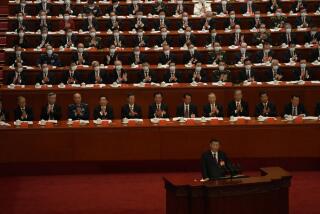Doctrinal Rift Delays China Artist Parley
- Share via
PEKING — In the wake of continued ideological skirmishing between left-wing and right-wing political factions, Chinese authorities have postponed what was to have been the first nationwide congress of writers and artists since 1979.
The delay is an indication of the highly charged maneuvering going on in Chinese political and intellectual circles between supporters and opponents of the reform program being carried out by the regime of Deng Xiaoping.
One of the main underlying issues is the extent to which artistic and intellectual freedom should be permitted. In December, one of Deng’s top aides spoke at a smaller conference of writers of the need for literary freedom in China. But since then, there have been signs that some high-ranking officials believe that the Communist Party should maintain close control over writers and artists.
There has been no official nationwide congress of writers and artists in China since October, 1979. According to Chinese sources, such a congress was scheduled to begin here Friday, and hotel rooms had already been booked for visitors from other parts of the country. But the session was quietly called off earlier this month, at least until after September.
A spokesman for the liaison department of China’s Federation of Literary and Art Circles confirmed Wednesday that the writers’ and artists’ convention had been scheduled to take place and has now been delayed.
A September date is of considerable significance. That month, officials of the Chinese Communist Party will meet at an extraordinary conference in which the party leadership, including the Politburo, is expected to be shaken up.
Deng and his top aides, party general secretary Hu Yaobang and Premier Zhao Ziyang, hope to emerge from that conference with a party leadership more strongly supporting their reform programs.
In China, art and literature are often a testing ground for political battles. Allies of Deng had at first hoped that holding a congress of writers and artists this month would enable them to show their political strength and gain momentum for the September meeting.
Instead, since February, those in the Communist Party who advocate a more conventional approach have been gaining strength. They have directed their attack on such things as money-making lotteries, unapproved newspapers, Hong Kong songs and fashions, corruption, and what they say is an overemphasis on material values.
Last month, one of the strongest advocates of a more traditional approach to cultural matters, Deng Liqun, head of the party Central Committee’s propaganda department, attacked what he called “distorted” concepts of freedom.
Speaking to local cadres in Sichuan province, he said: “For a period of time, the erosion of the negative factors has been very serious--for example, the publishing of unhealthy tabloids and the business related to pornographic videotapes and the rampant dissemination of various kinds of books and publications of low taste. Many comrades have informed us of the fact that money transactions have indeed already eroded the relations between our people.”
The propaganda chief, who is no relation to Deng Xiaoping, also urged further study of “the Marxist view of freedom,” including “the relationship between freedom and discipline.”
One well-known Chinese writer said recently that many intellectuals fear there may soon be a new political campaign against advocates of greater literary freedom.
More to Read
Sign up for Essential California
The most important California stories and recommendations in your inbox every morning.
You may occasionally receive promotional content from the Los Angeles Times.













